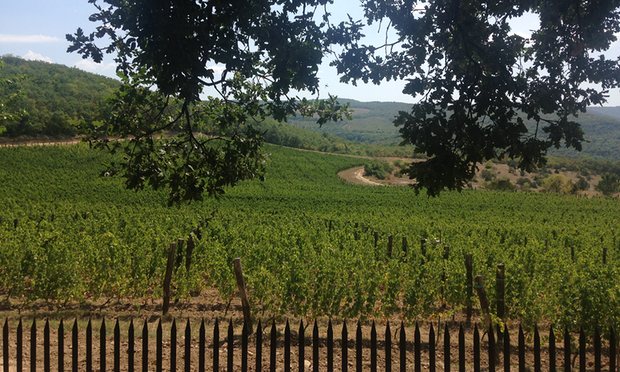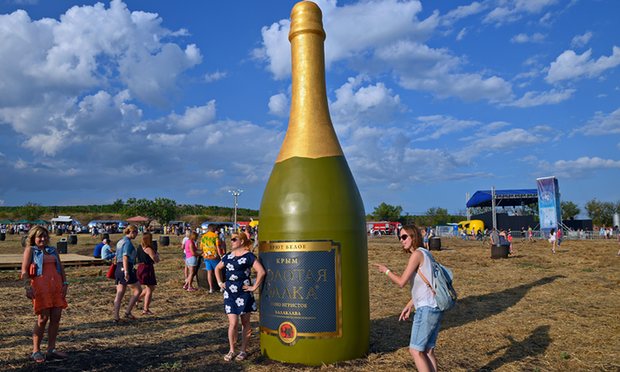Celebrating all things champagne in Crimea. Photograph: Katrina Kollegaeva
Since the Russian annexation local vineyards have been capitalising on gaps in the market triggered by western sanctions.
It was once the “Coca-Cola of the Soviet Union”, a homegrown luxury promoted by Josef Stalin as a promise of the supposed abundance soon to come to the USSR.
Now, more than 80 years since Stalin’s “invention” of Soviet champagne, a ban on western-imported produce triggered by Russia’s annexation of Crimea is prompting a revival in home-grown versions of foreign luxury goods.
This month, as part of its efforts to revitalise otechestvennoe (local production), the Russian state supported a festival at a prominent vineyard in Balaklava, Crimea which produces one of Russia’s most popular champagne brands, Zolotaya Balka. More than 12,000 people attended to drink, eat and listen to the headline band, called Leningrad.
The festival comes as the Russian government seeks modernise the Crimean economy. On a recent state visit, Russian prime minister Dmitry Medvedev announced that his government would invest 2.5bn roubles in “objects of cultural importance” in the peninsula, including local wine production, by 2020.
The Crimean “bureau of vine and wine”, set up before the annexation but which has seen a new lease of life under sanctions, is now working to champion local brands, including the popular Balka champagne. By 2025 they hope to have increased the production of Crimean-made wines by 20%.
The festival comes at a time when Crimea’s security situation is deteriorating. Russia and Ukraine stepped up safeguards on the de facto border between the peninsula and mainland Ukraine in early August, a day after Moscow accused Kiev of planning terror attacks on the peninsula.
The alleged incidents have raised tensions over Crimea to the highest level since Russia annexed the region from Ukraine in 2014. Russia’s FSB security service claims to have detained a Ukrainian terror cell with 20 homemade explosive devices inside Crimea, and repelled fire from across the border in a separate incident. The FSB said one of its officers and a Russian soldier died during the clashes.
But locals like Bogdan Parinov, a chef at Crimea’s first 5-star hotel, Villa Elena, are trying to make the best of a challenging political situation. Parinov says sanctions have helped spur on the local food industry. He sources most of his ingredients from the peninsula and makes his own cheeses. He’s even named one variety Black Out, “in tribute” he says to the electricity shortages that have hit the area since the annexation.
 A vineyard in Crimea. Locals say the area is primed for a winemaking renaissance. Photograph: Katrina Kollegaeva
A vineyard in Crimea. Locals say the area is primed for a winemaking renaissance. Photograph: Katrina Kollegaeva
Rich history
As the Soviet Union developed in the early 1920s, the government asked Russian wine-makers to devise a recipe for a new “champagne for the people” that would be cheap, quick to produce for the working masses.
The winning recipe came from Anton Frolov-Bagreyev, who used a blend of Aligoté and Chardonnay grapes matured in large tanks, rather than individual bottles. The result, named “Sovetskoye Shampanskoye”, was launched after a decree in 1936 and became popular across the Soviet region.
Today most champagne makers in Crimea use a variation of Frolov-Bagreyev’s method, with tanks of grapes maturing over 1-3 months instead of the traditional 15 months required for French champagne.
Both methods can, in theory, produce good quality wine but Pavel Syutkin, the author of The Uninvented History of Russian Cuisine, says that any Crimean wine that costs less than 200 roubles (£2.50) is likely to be a “primitive mix of imported wine must, powders, spirit and colorants.”
In contrast, a bottle of Novyj Svet or Zolotaya Balka’s finest will cost around 400-600 roubles (£5-£8), and is considered a decent quality.
While internationally only the wines made in the particular region in France are allowed to call their produce champagne, the Novyj Svet vineyard, among others, still uses the label champanskoe, which they say is permitted as long as they only use the Cyrillic alphabet. Against a backdrop of increased political tensions, locals say local food production is still a source of pride. “Shampanskoe for a Russian person automatically means a celebration. Often it’s not a holiday that leads to shampanskoe but the other way round. Up until recently, I didn’t have a great desire to drink otechestvennoe – until I’ve visited a few wineries – [now it is] Novyj Svet or Zolotaya Balka for me,” says Katerina Semenova, a tour guide in Yalta.
Katrina Kollegaeva in Balaklava, 24 August 2016, The guardian





